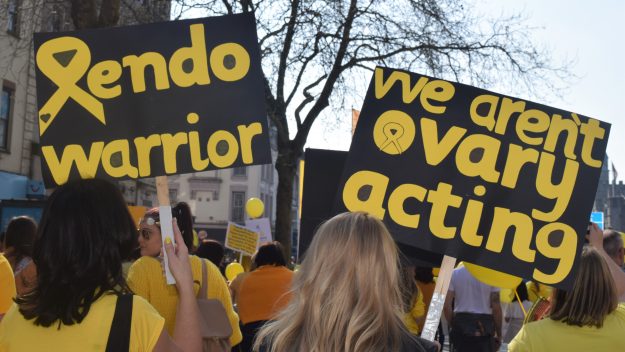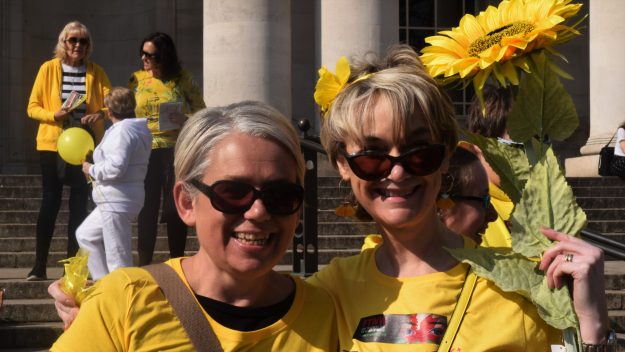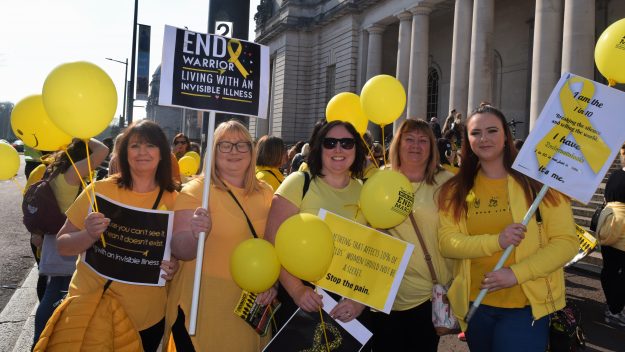One in ten women have endometriosis, but very few people know and understand what this debilitating condition actually is. EndoMarch is working to change that.

On a sunny Saturday in Cardiff, over 40 people wearing bright yellow for the Welsh stage of EndoMarch 2019, a series of marches coordinated throughout the month of March to raise awareness of endometriosis.
Endometriosis is a condition where tissue that normally grows inside the uterus begins growing in other places, such as the ovaries and fallopian tubes, often causing extreme pain for women with the condition.
“It’s really sort of taking over my life from the age of 13,” said Lara Morris, one of the march participants. “It’s got progressively worse causing my university days to be agony, my school days to be agony and my work days to be agony.”
Morris has had over nine different surgeries to treat her condition and her pain, culminating with a hysterectomy last year. The pain she’s experienced during her 38-year battle with her condition has caused her to cut back on her job to one day a week, and has given her suicidal thoughts at times.
Several other women present shared similar stories to Morris’s, all citing years of pain and, most importantly, lack of understanding from their doctors.
“I lived in isolation for years,” said Julie Richards, a march participant. “No one had even heard of endometriosis, so it’s very very important for me to be here today to get the word out.”

Approximately one in 10 women are affected by endometriosis, but very often their symptoms are simply chalked up to regular period pain or dismissed because doctors don’t believe them.
“I’ve been in this business a long time, and let me tell you, it is so much getting better but it’s not good enough yet,” said Elizabeth Bruen, an endometriosis and pelvic pain specialist at Cardiff and Vale University Health.
Bruen is the only endometriosis specialist in Wales and believes that one of the biggest issues for women trying to get treatment is having doctors believe them.
1 in10 women suffer with Endometriosis, it takes on average 7-10 years to get a diagnosis and yet there are still so many undiagnosed…
Why don't we know more?!?
We desperately need as many people as possible on board with The Rising Awareness movement to help change things for pic.twitter.com/K6reBDuxQZ— Jaimee Rae – EndoWall – The Rising Awareness (@RaeJaimee) March 22, 2019
“I transferred to the Cardiff University of Wales because that’s where the endometriosis specialist is and I learnt a lot from the drugs and the chronic pain and everything and it’s fantastic,” said Morris. Today, Morris works to help raise awareness of the condition so that other women don’t have to experience what she went through.
Richards, Morris and Bruen are also a part of Fair Treatment for the Women of Wales (FTWW), an organisation dedicated to women’s health equality. One of FTWW’s specific campaigns is endometriosis education.
“This is actually the fourth successful event that we’ve had,” said Karla Edwards, one of the FTWW organisers behind this year’s march.

FTWW helped to organise the march and bring in speakers such as Bruen to help educate people on endometriosis, as well as providing endometriosis survivors with a place where they can find other survivors.
Cardiff also boasts the EndoWall, an artistic representation by another endometriosis survivor Jaimee Rae to help raise more awareness and help more people learn about the condition.
Morris and Richards encourage all young women who are experiencing endometriosis to reach out into their communities to find other women living with the condition. Both cite the support they’ve received through such communities as crucial, especially when things aren’t going so well.
“Most importantly, when you’re having a really bad day is there is people out there who understand,” said Morris.
